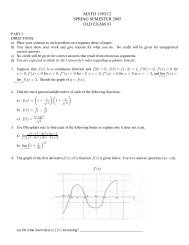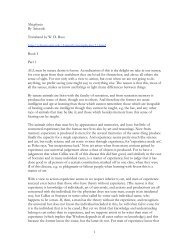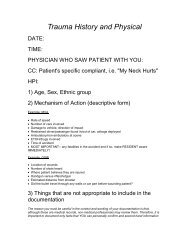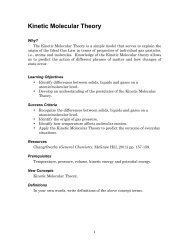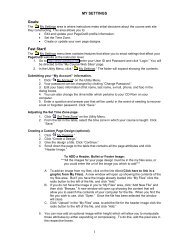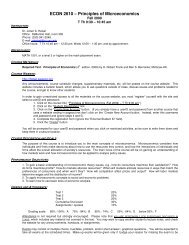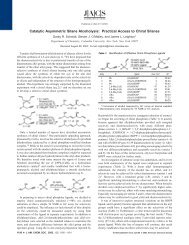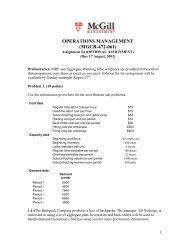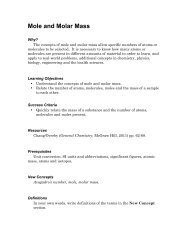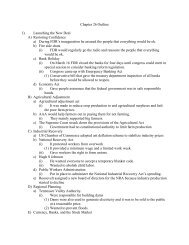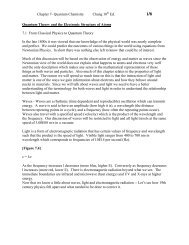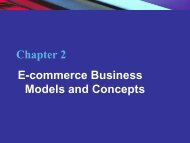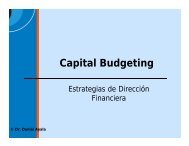Chapter 33 study guide - PageOut
Chapter 33 study guide - PageOut
Chapter 33 study guide - PageOut
Create successful ePaper yourself
Turn your PDF publications into a flip-book with our unique Google optimized e-Paper software.
<strong>Chapter</strong> <strong>33</strong> <strong>study</strong> <strong>guide</strong>Glossary TermsNixon Pardoned- The new president granted Richard Nixon “a full, free, and absolute pardon”for any crimes he may have committed during his presidency. Ford was trying to spare the nationthe ordeal of years of litigation and to spare Nixon himself any further suffering.General Ford- General Ford inherited the presidency under unenviable circumstances. He had totry to rebuild a confidence in government in the face of the widespread cynicism the Watergatescandals had produced.Election of 1976- Jimmy carter was a former governor of Georgia who swept the south in the1976 election. He carried enough of the industrial states to win a narrow victory over Ford. Heindicated the importance of the Democratic Party.Carter’s lack of Direction- Though Carter was among the most intelligent men ever to serve inthe White House, his critics charged that he provided no overall vision or direction to hisgovernment. His ambitious legislative agenda included major reforms of the tax and welfaresystems; Congress passed virtually none of it.High interest rates- Carter appointed G. William Miller and then Paul Volcker to head theFederal Reserve Board, thus ensuring a policy of high interest rates and reduced currencysupplies. By 1890, interest rates had risen to the highest levels in American History.Malaise Speech- Carter gave this speech to help fuel charges that the president was trying toblame his own problems on the American people. Carter’s sudden firing of several members ofhis cabinet a few days later deepened his political problems.Human Rights- Human rights would replace selfish interests. Carter often spoke sharply aboutviolations of human rights in many countries, The Carter administration focused on several moretraditional concerns.National Interests- Carter began looking upon the interests of the nation. He began making peacetreaties and negotiations that seemed impossible. For example, he made a peace treaty betweenEgypt and Israel and negotiations with the Middle East.Camp David Accords- The Palestinian refugee issue was one of the most sensitive issuesbetween the two parties, and Carter made a compromise on it. Begin and Sadat returned togetherto the White house to sign a formal peace treaty. It was known as the Camp David Accords.Iranian Revolution- Many Iranians resented the repressive, authoritarian tactics through whichthe Shah had maintained his autocratic rule. They also loathed how the clergy opposed his effortsto modernize and westernize a fundamentalist society. The combination of resentmentsproduced a powerful revolutionary movement.
Carter’s Falling Popularity- Domestic economic troubles and international crises createdwidespread anxiety, frustration, and anger in the US, This damaged President Carter/s alreadylow standing with the public, and gibing an added strength to an alternative political force thathad already made great strides.Khomeini- Ayatollah Khomeini was the spiritual and eventually also political leader of theIranian Revolution that created so many difficulties for the United States. Just like the Iranianpeople, he too was fed up with the resentments he had for his countries leaders.The Sunbelt- The Sunbelt included the Southeast and the Southwest. (Florida, Texas, andCalifornia) The term Sunbelt was coined by the political analyst Kevin Phillips to describe acollection of regions that emerged together in the postwar era to become the most dynamicallygrowing parts of the country.Sagebrush Rebellion- This rebellion emerged in parts f the West in the late 1970s. It mobilizedconservative opposition to environmental laws and restrictions on development; it also sought toportray the West as a victim of government control. Members of it complained about the aboutof land the federal government owned in many western states.The Mall- In cities and towns in every part of America, malls became not just places forshopping, but often centers of a much altered community life as well. No longer was a singledepartment store the main attraction for shopping. In 1956, the first enclosed shopping centerwas completed.Suburban Conservation- The most militantly conservative communities in America were mostlysuburbs, they tended to attract people who wished to flee the problems and the jarring diversityof cities, who preferred stable, homogeneous surroundings.Evangelical Christianity- Evangelicalism is the basis of many forms of the Christian faith, butthey have in common a belief in personal conversion through direct communication with God.The religion had been the dominant for of Christianity in American through much of its history.Moral Majority and the Christian Coalition- These groups, and others like them, denouncedabortion, divorce, feminism, and homosexuality. They defended unrestricted free enterprise, andsupported a strong American posture in the World.Ronald Regan- Ronald Regan was chief among this new generation of conservative leaders. Hewas a liberal. He became a corporate spokesman for General Electric and won a wide followingon the right with his smooth, eloquent speeches in defense of individual freedom and privateenterprise.Proposition 13- This was a proposition that was a referendum question on the state ballot rollingback property tax rates. Similar movements soon began in other states and eventually spreadinto national politics. Howard Jarvis launched the first successful major citizens tax revolt withthis proposition.
Contras in Training- Contras were the people who opposed the leftist Sandinista regime. TheReagan support for these contras was the source of some of its greatest problems. The men hadarmy suits on, and weapons.Federal Budget surplus/deficit- Federal Deficits seemed so alarming to Americans in the 80s, andthose deficits proved much less damaging to the economy than many predicted. There was adramatic increase in the size of federal deficits.SDI- Widely known as “star wars”, The Strategic Defense Initiative (SDI) was proposed by thepresident as the most ambitious and potentially most expensive new military program in manyyears. Through the use of satellites, SDI could provide an effective shield against incomingmissiles and thus make nuclear war obsolete.Reagan Doctrine- This new doctrine meant a new American activism in the Third World. Itbegan to support opponents of communism anywhere in the world, whether or not the regimes ormovements they were challenging had any direct connection to the Soviet Union.Combating Terrorism- During the 80s, there was a bunch of terrorist acts upon the US. Therewere attacks on airplanes, cruise ships, etc. Officially the Reagan administration waged war onterrorism, but in reality it remained an elusive foe.Persian Gulf War- This was the first war against Saddam Hussein. The first time we had thebacking of the UN and we sent in over 600,000 troops. Over half of them were American. Willbeat them badly. They had over 100,000 failures while we had 141.Mikhail Gorbacker- This man started the transformation from Communism to Democracy. Heallowed every communist state un Europe that was controlled by the Soviet Union to beoverthrown to cut losses.Tianamen Square- A massacre of students who launched a protest of communism and called fora democrat in China. A group of hard line communists seized control of the government andkilled the protesters. The amount of people killed is still unknown.Dissolution of the USSR- Some communists put Mikhail Gorbachev out of power but he soonreturned to power. But because of the failure of the hard line communists, the power ofcommunism in Europe faded and the Soviet Union republics declared independence. Mikhailresigned as leader of the communist party and the Soviet Union.Iran-Contra Scandal- The government had been running secret programs in order to advance theadministrations foreign policy. It was sometimes illegal. It was proven that the North had been
operating under orders from people with more power in Reagan’s administration. Reagan’spopularity and trust was hurt.Bush’s Negative Campaign- Bush, a member of the 1988 election, won for presidency. DespiteReagan’s failures of his unceasing attacks of the oppositions links to all of the unpopular thingsabout being liberal.Moral Majority- Fundamentalist minister Jerry Falwell started This IF launched an attack againstsecular humanism. They also attacked federal interference in local affairs. They believed inunrestricted free enterprise and a strong American international presence.Nuclear Freeze Movement- Movement of Congress’s widely supported by the people to stopproduction of nuclear warheads. It sparked the largest mass demonstration in the history of theUS.Geraldine Ferraro- This was the first woman to run as vice-president. She ran under theDemocratic ticked with Walter Mondale. They failed miserably, for at this time, women werestill considered to not be able to hold such a high seat in office. Many people would not feelsecure with a woman helping to run the country.1990 Recession- Because of the debt in America, everyone went into Reagan’s administration.Many people went bankrupt. People and business were afraid to make any new economicventures, keeping the economy down.Invasion of Kuwait- Saddam Hussein sent troops to invade their small oil rich southern neighbor.Saddam declared that he was annexing Kuwait. Bush had convinced almost all of the powerfulgovernments of the world to participate in the trade embargo of Iraq to force them to stop.Bill Clinton- Ran in the election of 1992. He got a chance to run because not many Democratsdecided to run this election. They were afraid because of how popular Bush was at this time. Hebeat both Bush and Perot in this election.The election of 1992- Bush was very popular during this time; so many democrats didn’t run forpresident. This gave Clinton a chance to run. Clinton beat Bush because of is charisma and RossPerot’s popularity. Perot took votes from Bush while Clinton had much of the Democratic vote.Ross Perot- He was a multibillionaire who ran for president against George Bush and Clinton. Attimes he led both in the polls. However, after intense scrutiny from the media he dropped out ofthe race. Later, he rejoined and gained most, bun not all of his old following back
From the Age of Limits to the Age of ReaganThe defeat in Vietnam, the Watergate Crisis, the decay of the American economy were afew instances that made changes to the confident, optimistic nationalism that had occurredduring the postwar era. It was called “the age of limits”. Americans got used to knowing thatthey would have to live with increasingly constricted expectations. However, in a few yearsanother answer to the challenges was beginning to show. It was an idea that reinforcedcommitment to the idea of economic growth, international power, and American virtue.As General ford came into power, one of the first things he did was that he granted Nixona full pardon for any crimes he may have committed during his presidency. During the time ofhis presidency, the American economy was very poor. Inflation was rising, and it caused arecession. Ford organized an arms accord with Leonid Brezhnev that paved the way for SALTII. He also had Kissingner work with Israel convince them to return the parts of Sinai that theyhad taken back to Egypt. A new government came into power that wanted to renew relationswith the US when Mao Zedong died.Known as the least popular president in the history of the century, Jimmy Carter’sadministration did not go too well. To the outside world, his attitude portrayed a person who hadby no means any ambition to achieve the goals he had set. He raised public spending and cutfederal taxes to take care of the recession that the country was in during his term; however, thislowered unemployment, but the recession continued. One cause was OPEC, who kept raising theprices of oil and power, causing inflation to rise. He was also unpopular because of the very highinterest rates he employed and the tight money tactics he supported to raise the value of thedollar. Though he was very unpopular, he did do many things correctly. He established the CampDavid Accords, resumed friendly relations with China, and started negotiations for the SALT IIarms agreement. He was mostly known for the incident of the hostages taken by Iranianrevolutionaries. Ayatollah Khomeini planned and executed the whole affair. He came intopower after the Shah of Iran was banned, despite our efforts to keep him in power.During this area, the Sunbelt was brought into effect. It had the greatest populationincrease of anywhere in the US. The main areas of the Sunbelt were in Texas, Florida, andCalifornia. It also had the greatest concentration of new, powerful, conservatives that started theSagebrush Rebellion. This was also a time of religious revivalism- a time when EvangelicalChristianity became popular. Bill Graham and Oral Roberts led this belief. It gave Carter achance to fight racial and economic injustice and to fight for world peace. Others felt stronger tofight issues like, feminism and abortion. Out of Evangelicalism rose two new groups: MoralMajority and The Christian Coalition.Reagan took Goldwater’s place as the leader of the New Right and helped increase itspower. This happened after the Goldwater Scandal. The New Right was more successful thanthe Old Right. They achieved the same things though. They attacked taxes because nobody likedtaxes. They did this to limit funding for social programs so they could keep more support oftheir constituents.Carter performed very badly during the campaign between Carter and Bush. Carter’spolicies and the hostage situation was one factor that hurt Carter. Another factor was Reagan’s
popularity and his ability to communicate with others. He lost the election 41% to Bush’s 51%and John Anderson’s 7%. As soon as Reagan was inaugurated, the Iranians let the hostages go,for they were afraid of Reagan.The Reagan Coalition was made up of 3 groups who supported it. The three groups wereThe Corporate Elites, the Neo-conservatives, and the Populist Conservatives. The about ofpeople affected positively by Reagan showed that he was able to appeal to many differentpeople. This was partly because of his appearance and ability to communicate, and it was alsobecause of the things he did. He believed in Supply-Side economics. These eventually workedagainst the recession by instigating a 40 billion dollar cut in the federal budget. There was a 25%tax reduction, deregulation of federal agencies, and support of the tight-money policies put intoplace by Carter. He also cut massive amounts of social and domestic programs. Soon, however,the people and the congress soon didn’t want any more cuts. Therefore, congress passed anamendment that made a balanced budget that Reagan supported. However, toward the end of histerm, his program started working, so the amendment was unnecessary.Reagan started SDI and resumed arms control negotiations with the USSR. Americaoverthrew anti-American Marxist governments in Grenada, Nicaragua, and El Salvador.Terrorism was becoming a major problem in America at this time, so the government tookcontrol to work against terrorism, however, it was not very effective. Because of the thingsReagan did, he easily beat Walter Mondale in the 1984 election.All over the world there was support for democratization. Mikhail Gorbachev was asupporter of the Communist states in Eastern Europe. They wanted to overthrow theirgovernment and start democratic ones. For example, the Chinese students called for democracy,but they were massacred. In South Africa, the government gave full rights to all blacks becauseof internal and external support. After a somewhat successful coup by hard liners againstGorbachev, the USSR lost all of its Communist and Soviet Power. Because Russia was too weakto do anything about it, Soviet republics declared their independence. Gorbachev took out forcesfrom Afghanistan because there was a lack of money.At this time, banks became corrupt. This was due to the deregulation. The governmenthad to get involved in order to avoid a downfall in the banking industry. Other problems were inthe Iran-Contra Scandal. It was because of this scandal the Republican Party lost power.However, the Democratic Party was very weak at this time and Bush was still able to win thepresidency. Bush did have a lot of domestic problems because of his commitment to lower thedeficit without raising taxes.We invaded Iraq when Bush organized the UN. This happened after Iraq invaded Kuwaitfor their oil. Saddam couldn’t handle this and agreed to a cease-fire. Despite Bush’s internationalsuccess, the recession back home, Clinton’s smooth talking, and the intrusion of Ross Perot inthe race, Bush lost and Clinton won the next election. Clinton won 370 electoral votes to Bush’s168. Ross Perot did not win any electoral votes. Democrats retained control of both houses ofcongress.
Social, Political, Economic, Cultural, andDiplomatic ChangesSocial Changes• Moral Majority• Evangelical Christianity• Nuclear Freeze Movement demonstration• Christian Coalition• Abortion made legal• Radical Feminism• Welfare cut• International democratization• Iran-Contra Scandal• Bisexualism increasingPolitical Changes• Watergate Scandal• SALT II• Control of the Panama Canal• Reagan Doctrine• Arms Control Deal• Nuclear Freeze• Camp David Accords• Tax Revolt• Welfare cut• Gulf War• Soviet Union Ended• Reagan Supported by manyEconomic Changes• Deregulation• Reaganomics• Tight Money• High Interest Rates• Long Term Recession• High Oil Prices• Good terms with China• Tax Revolt• Soaring National Debt• Welfare Cut• Invasion of Kuwait• Better terms with USSR
Cultural Changes• US supports contra rebellion• Evangelical Christianity• Human Rights• Suburban Conservation• The Mall• Moral Majority• Reagan Revolution• Neo-conservatives• Inflation• Welfare benefits cut• Tianamen Square• Soaring national debtDiplomatic Changes• Camp David Accords• Proposition 13• Corporate Elites• Marching for Disarmament• Reagan Doctrine• Tianamen Square• Dissolution of the USSR• Reagan is President• Mikhail Gorbachev is leader of USSR• Bush is President• Clinton beats bush in election• First female runs for VP
<strong>Chapter</strong> <strong>33</strong> OutlineI. Politics and Diplomacy after WatergateA. Ford Custodianship1. Nixon Pardoned1. Nixon was granted “a full, free, and absolute pardon” for thecrimes he may have committed during his presidency.2. American Economy1. Inflation was rising, so Ford called for corporations to help stop it;however, that didn’t work.2. Ford supported high interest rates3. He would not increase federal spending4. Therefore, a recession occurred5. Oil embargo- OPEC increased the price of oil drastically3. Ford’s Diplomatic Success1. Leonid Brezhnev2. Ford and Brezhnev signed and arms control accord that served asthe basis of SALT II.3. Mao Zedong died and a new government came into control andwanted to have better relations with the US.B. The Trials of Jimmy Carter1. Carter’s Lack of Direction1. Carter’s critics said that he had no desire to achieve his overallvision2. He also had no plans in mind for the government2. Problems of Energy and Economy1. Carter’s presidency started with a recessiona. To take care of this he raised public spending and cutfederal taxesi. This lowered unemployment but didn’t solve therecession3. OPEC caused inflation to soar4. High interest rates were a major problem at this time5. Malaise speech1. Carter delivered this famous speech2. He spoke as though he was blaming his own problems of theAmerican people.C. Human Rights and Interests1. Camp David Accords1. Carter, Sadat, and Begin went to Camp David to negotiate a peacetreaty between Israel and Egypt.2. Chinese Relations1. Deng Xiaoping was the new Chinese Leader in which Carterresumed formal diplomatic relations with.D. The Year of the Hostages
II.III.1. Iranian Revolution1. The US supported the Shah of Iran and hoped that Iran would be abuffer zone for us.2. Ayatollah Khomeini came into power3. Iranians let the hostages they were holding go because they werescared of ReaganE. Afghanistan1. Russia invades Afghanistan1. Upset, Carter imposed a grip of economic sanctions on Russia2. Withdrew the SALT II treaty from the consideration of the SenateThe Rise of the New American RightA. The Sunbelt and its politics1. Rise of the Sunbelt1. Populations grew in Florida, Texas, and California2. It brought forth many powerful conservatives who were veryhostile to the governmentB. The sagebrush rebellion1. I started conservative opposition to environmental laws and restrictionson development2. They complained about large plots of land owned in the West.C. Religious Revivalism1. Evangelical Christianity1. This was a belief that was spreading.2. It was a way to fight feminism, abortion, and the elimination of religiousobservance in schools.3. Moral Majority and the Christian Coalition1. This was started by Jerry Falwell2. Pat Robertson started the Christian CoalitionD. The Emergence of the New Right1. Ronald Reagan took Goldwater’s place as the leader of the New RightE. The Tax Revolt1. Proposition 13 decreased property taxes.2. Attacking taxes1. Republicans realized that the way to stop new governmentprograms was to lower taxes.F. The Campaign of 18901. Carter’s campaign was not popular2. Reagan did a good job, for he pointed out Carter’s faults3. Reagan won the electionReagan RevolutionA. The Reagan Coalition1. Corporate Elites did not like government interference in the market or inbusiness.1. Environmental Protection Agency2. Civil Rights Division of the Justice Department3. Department of Transportation
B. Neo-Conservatives1. This was a group of people who were unhappy with their party’s lack ofardor against communism. So, they started Neo-conservatives.1. We helped other countries like Nicaragua and El Salvador2. Populist Conservatives1. They liked Reagan but were later disappointed with him because ofthe Iran-Contra Scandal.C. Reagan in the White House1. He had a personality and appearance that Americans loved2. He was very, energetic which gave the people reassurance.3. He was known as the Teflon President4. At times, he didn’t even know things about his own polovies or whatone of his subordinates was doingD. Supply Side Economics (Reaganomics)1. This was followed by a 40 billion dollar cut in federal budget and a 30%tax reduction.2. Deregulation1. Environmental Protection Agency2. Civil Rights Division of the Justice Department3. Department of transportationE. Sources of the Recovery1. Tight money was issued and it lowered inflation2. There was a world wide energy glut that was caused by the collapse ofOPEC3. Federal Budget deficits pumped billions of dollars into the economyF. Reagan told the people that he would make a balanced federal budget during histerm.1. He reduced spending money so much that he accumulated more debt inhis 8 years than he did in the entire history of the county2. He tried to fix it with reductions in food stamp funding and a cut infederal subsides for low-income housing.G. The Fiscal Crisis1. Soaring National Debt1. He had created huge amounts of debt during his presidency. He,entitlement programs, and administration problems caused this.2. Welfare Benefits cut1. Social and Domestic programs were cut in order to try and solvethe national debt.2. Congress proposed an amendment making a balanced budget thatReagan supported. However, it started to lose its support.H. Reagan and the World1. Soviet Union1. He spoke harshly of the Soviet Regime because he said itsponsored world terrorism.2. Strategic Defense Initiative would be used to use lasers as a war device.3. Reagan Doctrine
IV.1. We helped many countries like Israel, El Salvador, and Nicaragua.4. Combating Terrorism1. Terrorism was a huge problem at this time2. Small groups were working together to fight against terrorism.I. The election of 19841. Reagan was the unopposed leader of his party2. The democratic party had more candidates3. It was believed that this election would be the dawn of a new era.American and the Waning of the Cold WarA. Democratization1. Mikhail Gorbachev came into power and changed the Soviet politicswith two new initiatives.2. Gorbachev ended up withdrawing funding for the Soviet influence inEastern Asia.B. Tianamen Square was a huge anticommunist movement that happened in China.People protesting there were later killedC. South Africa started to retreat from their enforcement of protection of whitesupremacy1. Many laws were repealed2. Nelson Mandela was elected3. Black South Africans could participate in electionsD. Dissolution of the USSR1. Gorbachev was put out of the country, but the people and the militarydidn’t like it, so he came back and took control again.2. Communism lessened and soon was no longer in Russia3. Gorbachev resigned as the leader of the Communist Party4. The Soviet Union ceased to exist.E. Iran- Contra Scandal1. We were selling weapons to the government of Iran to secure thereleases of the Americans being held hostage2. We then used that money to aid the Contras in Nicaragua3. This did not do anything good for Reagan’s presidencyF. The election of 19881. Many Democrats felt threatened to run against the Republicans becausethey were so powerful. One democrat did run; his name was Dukakis.2. Bush was running and he looked good compared to Dukakis.3. Bush killed him in the election.G. The Bush Presidency1. Bush and Gorbachev made a lot of agreements together.2. Bush couldn’t change much because he was trying so hard to reduce thedeficit.3. Many people and businesses went bankrupt.H. The Gulf War1. At the end of the Cold War, Bush had to decide weather to work ondomestic issues of regional and economic interests.
2. Saddam invaded Kuwait for its oil; however US helped and we got othercountries to raid Iraq, and we killed them.I. The Election of 19221. Bill Clinton won this election because or Reagan’s recession beingblamed on Bush, his personality, and because Ross Perot helped steal therepublican votes.2. Clinton won the election.Guided Question 1Guided Questions and Supporting DetailsThroughout the Age of Limits, people in America realize that they must live amongrestricted expectations. At this time the economy was poor, and the President was part of theproblem.I. Defeat in VietnamA. People and government to lose confidence in military power if they arealways losing1. Less public support towards the militarya. If people don’t have faith in their military they wont investmoney in itII. Watergate ScandalA. One of the most famous scandals in historyB. Causes the people to lose confidence in the government and politicians,especially the president1. When people realize there is a problem with the president, theystart to realize the true meaning on The Age of LimitsIII. RecessionA. Soaring national DebtB. People and corporations lose confidence in the economy1. This makes them less likely to invest in thingsa. Keeps the economy downb. People aren’t spending enough to support businesses bothsmall and largeIV.ResultA. People begin to believe that America was limited1. It has been years since this was thoughta. People realize not to have too many expectations in the USat that time.The realization of this time hit Americans as the Age of Limits, for their expectationswere limited. Many problems were occurring at this time in the economy, thegovernment, and the military.
Supporting details for Guided Question 1• High interest rates• Carter’s lack of direction• Falling popularity• Sagebrush Rebellion• Neo conservatives• Defeat in Vietnam• Recession• Soaring National Debt• Watergate Scandal• Bad economy• Confidence• Military power• Politicians• Democrats• Republicans• Food Stamps• Welfare benefit cuts• Contras• Disarmament• Federal Budget deficit• Tiananmen square• Gorbachev
Guided Question 2Jimmy Carter was one of the Lease popular presidents because he had a bad presidency.He had no ambition, a lack of direction, a bad attitude, and made many political errors. Hebrought about high interest rates, gave the Panama Canal Back, and was held responsible for theinvasion of Afghanistan.I. Attitude and Lack of directionA. He seemed to be inflexiblei. People didn’t want to work for himii. Didn’t trust his decisionsB. Was not ambitiousi. He would set goals and didn’t seem to have any intentions on achievingthem.ii. He was a bad planner so congress was unable to pass many laws of hisbecause they only knew the result of his plans, not the step process toachieve that goal.II. High interest ratesA. Inflation was very highi. Appointed some conservative economists to the Federal Reserve BoardB. Reduced inflationi. New policies reduced inflationii. However, they also made him unpopular with the people1. They couldn’t pay eh interest rateIII.IV.2. Their money supply was too lowPanama CanalA. He gave it back to panamai. The Conservatives didn’t like this idea, so he lost their supportSALT IIA. This placed restriction on US and Russia on how many long-range missiles,bombers, and nuclear warheads could be made and kept.i. Lost more support from the conservativesV. International ProblemsA. Russia invaded Afghanistani. Oil prices rose1. Carter was blamed for itB. Combination of domestic and international problemsi. Even if he was not responsible for the problems, he was often blamed.President Carter was not known for very many good qualities. He caused a lot ofproblems during his time or presidency that affected the American people greatly.Therefore, he was known as the least popular president in history.
Supporting details for Guided Question 2• SALT II• High interest rates• Invasion into Afghanistan• Panama Canal• Lack of direction• Attitude• Ambition• Lost support from people• Informality• Conservatives• Restriction• Soaring national debt• Iranian Revolution• Reduced inflation• Soaring inflation• Not able to pass laws• Low currency• Unhappy people• Camp David Accords• Nuclear warheads• War• High interest rates
Guided Question 3Many different factors contributed to the economic, social, and political aspects thatmade up the Reagan Revolution. These consisted of Reaganomics, Deregulation, his effect onthe USSR, the Reagan Doctrine, and the Star wars program.I. Economic FactorsA. Reaganomicsa. Cut in Federal budgeti. 40 billion dollar cutb. 30% tax reduction… but congress passed it when they changed it to 25%B. Deregulationa. Environmental Protection Agencyb. Civil Rights Division of the Justice Departmentc. Department of TransportationC. Recoverya. Tight moneyi. Lowered inflationb. Lower interest ratesi. People could have more moneyc. Worldwide energy gluti. Fuel costs rised. Federal Budget deficitsi. Rise of stock marketII. PoliticalA. Soviet Uniona. He said that Soviet regime sponsored world terrorismB. Strategic Defense Initiativea. Use of lasers and satellites for warC. Reagan Doctrinea. Activism in Third Worldb. US helped el Salvador, Nicaragua, and othersi. Trained contrasD. Election of 1984III. SocialA. Cold war Tensionsa. Nuclear Freeze movementi. Caused the government to resume small efforts to negotiate armscontrol.President Reagan performed many actions and made many decisions that resulted inmany changes in America. They contributed to the economic, social, and political aspects thatmade up the Reagan Revolution.
Supporting Details for Guided Question 3• Corporate Elites• Contras• Iran-Contra Scandal• Election of 1984• Cold War• Social• Nuclear Freeze Movement• Negotiation• Low income• Populist Conservatives• Palestinian Liberation Organization• Neo-Conservatives• Department of transportation• Strategic Defense Initiative• Arms control• Reagan Doctrine• Soviet Union• Federal assistance• Economy• Civil rights division of the Justice Department• Environmental Protection Agency• Third World• Grenada• Anti-American Marxist regime• Environmental Protection Agency• Civil Rights Division of the Justice Department• Department of Transportation• El Salvador• Nicaragua• Deregulation• Populist Conservatives• Political
Guided Question 4Ronald Reagan was able to please the Corporate Elites and the Neo-Conservatives;however, at times he tended to greatly disappoint the Populist Conservatives.I. Corporate ElitesA. Corporate Elites didn’t like the government interfering in the market of businessi. Reagan started the deregulation process so that the government wouldn’thave to interfere so muchB. Deregulationi. Environmental Protection Agencyii. Civil Rights Division of the Justice Departmentiii. Department of TransportationII. Neo-ConservativesA. This was a group of people who didn’t like the party’s lack of ardor against ccommunism, so they started neo-conservatism. This group consisted of peoplewho used to be socialists and liberals.1.Reagan Doctrinea. American Activism in 3 rd worldb.American Soldiers sent to Grenadac.Sent money and soldiers to El Salvador to help the governmentd.In Nicaragua we helped a pro-American dictatorshipe.Helped Israel when they drove the Palestinian Liberation Organizationfrom LebanonIII. Populist Conservatives1. Reagan appealed to both the Populists and the Corporate Elites.2. Iran-Contra Scandala. Disappointed the peopleb. Nicaragua confirmed the Populist Conservativesuspicion of the government and its goalsAs president, Reagan was able to please and displease many people. While hepleased the Corporate Elites and the Neo-Conservatives, he displeased the PopulistConservatives.
Supporting Detail for Guided Question 4• Grenada• El Salvador• Nicaragua• El Salvador• Lebanese government• Government• Illegal operations in Iran• Civil Rights• Government institutions• Military barracks• Deregulation• Populist Conservatives• Corporate Elites• Liberals• Socialists• Environmental Agency• Environmental Protection Agency• Neo-conservatives• Palestinian Liberation Organization• Communists• Iran-Contra Scandal• Reagan Doctrine• American Activism• Civil Rights Division of the Justice Department• Department of Transportation• Environmental Protection Agency




